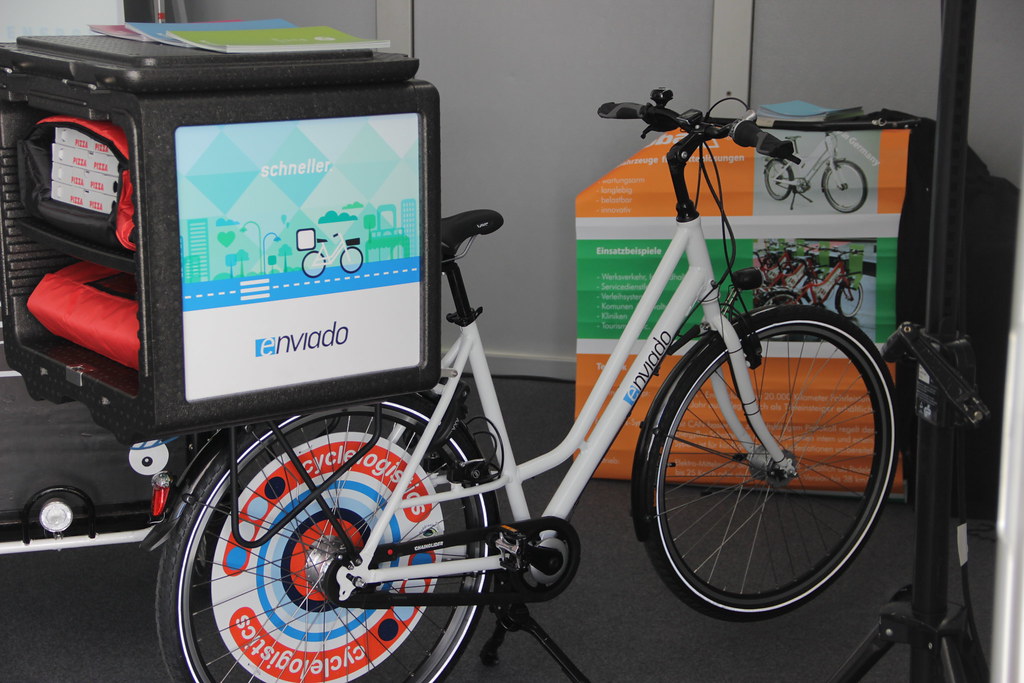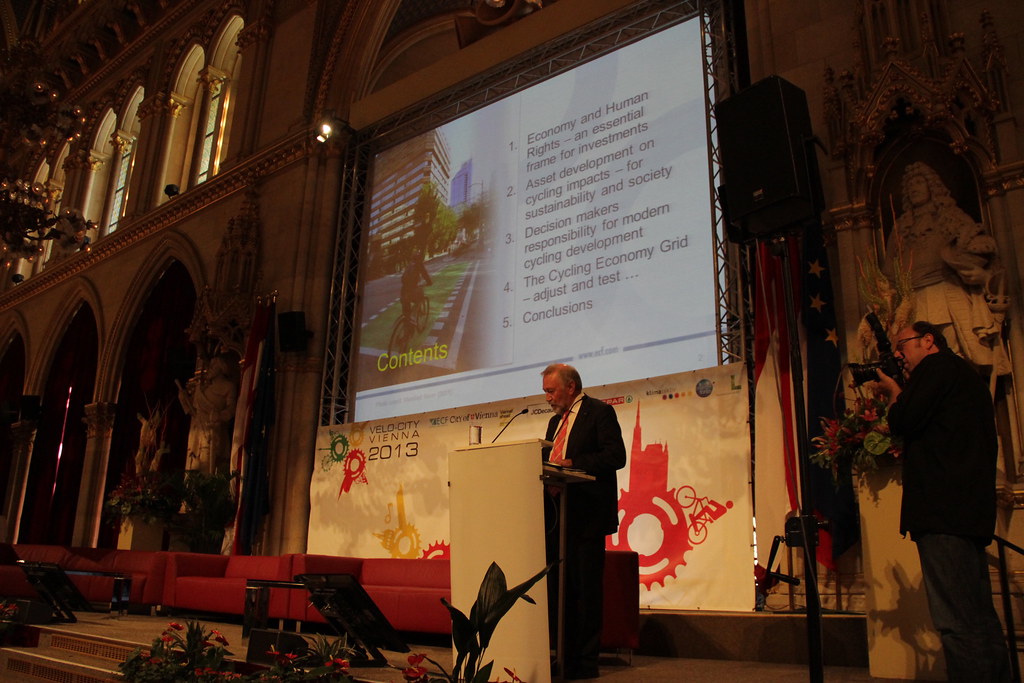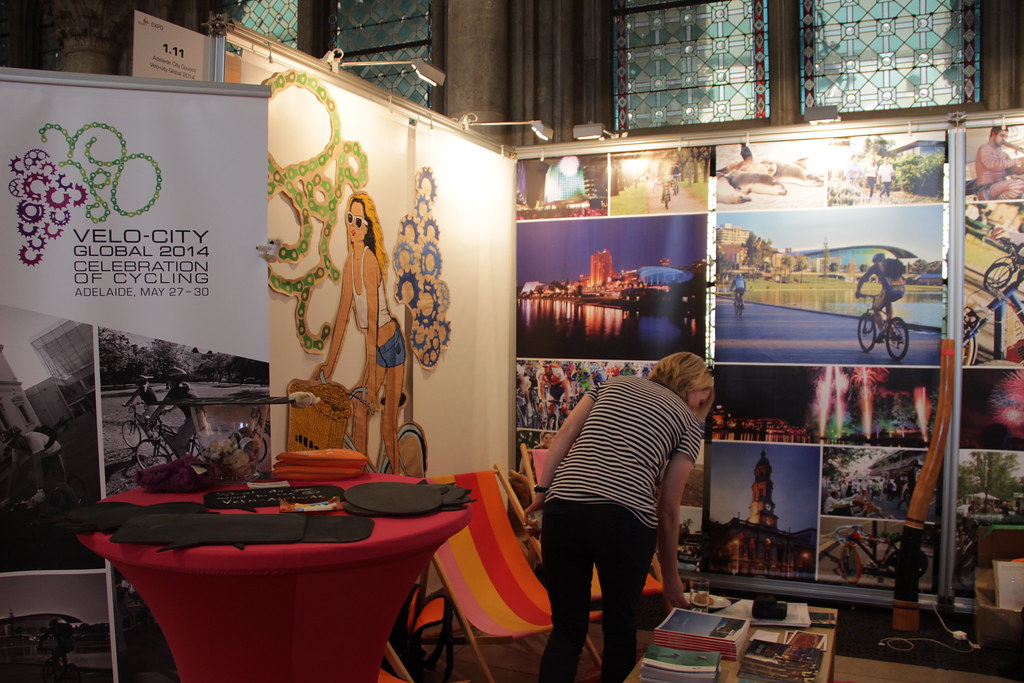
Velo-city Day 3 Roundup: Cycle Logistics, B-Track-B, and What the Industry Can Do
Discuss, inspire and share ideas on cycling: that's what Velo-city Vienna is still about after its third day. On Thursday, the focus was on motivationg cyclists to ride their bikes more often and transport goods with them, as well as the next Velo-city conference in Adelaide. We also have some highlights from the speeches by Manfred Neun and Randy Neufeld.
- Randy Neufeld - The Bicycle Industry and Cycling Promotion
- BtrackB - Who Doesn't Like Carrots?
- CycleLogistics - Back to the Future
- Manfred Neun - Cycling is a Human Right
- Velo-city Global 2014 in Adelaide
Randy Neufeld - The Bicycle Industry and Cycling Promotion

Cycling in the US has a huge potential, but the world's largest economy is also probably the most car-centered country in the world. The SRAM cycling fund with its director Randy Neufeld, though, is doing its best to change that.
"In the bicycle industry, we have recently joined forces to sponsor biking advocacy," Mr Neufeld explained. "For example, we are sponsoring study tours for US city officials to Europe."
"The US cycling advocacy organisations receive $4 million from the industry and $3 million from other foundations, so that makes clear how important we as industry are in order to promote cycling in the United States."
While Europe remains more bike-friendly than The US, Mr Neufeld nevertheless had some observations about where there is room for improvement for European bicycle manufacturers when it comes to promoting cycling.
"In Europe the biking industry normally works on technical standards and trade lobbying, but rarely on the use of public space, mobility or health, which are all very important fields for cycling."
He also pointed out that today the ECF Cycling industry club has 29 members, whereas there are more than 1200 companies registered every year at the Eurobike show. Mr Neufeld believes that if the European industry would reach the level of the US in terms of funding advocacy, there could be close to 10 million€ in funding made available.
“But our aim must be more than money,” he said, followed by a message towards the cycling advocates: "Meet an industry contact. Talk to him or her about your goals in tangible and measurable words. Ask them to weigh in on a local cycling decision. And lastly, include them in the loop and show them how they can benefit from taking part in the advocacy work."
To be sure, Mr Neufeld wants to help them do so.
"The industry looks forward to working more closely with bicycle advocates in the future."
BtrackB - Who Doesn't Like Carrots?

B-Track-B is ECF's project designed to make cycling cool. ECF's Henk Hendriks presented the project at Velo-city today.
"B-Track-B is a system of checkpoints throughout the city. When they participate in the program and pass these checkpoints, cyclists can gather points," Henk explains. Using the B-Track-B smartphone app and website, cyclists can then see how much they have cycled over any given period.
Henk says these points could then be used to reward those who are cycling the most. "And it could make cycling a subject to be discussed at the dinner table: 'Hey, look at my points today!'"
Rewarding cyclists has a positive effect, Henk explains. "Some parents could pay their children for cycling to school - in order to let them keep part of the money the public transport would have cost. Retailers could lower prices for people coming to their shop by bike - to make them aware of how many people would actually come to their premises by bike. Such things become possible if a city uses B-Track-B."
Henk also pointed out that when people's situations change, there is often an opportunity to change their mode of transport as well. "For this reason, children changing from primary to secondary school are a good target group for example."
The Dutch city of Helmond agrees. Just this week, the city's administration announced they were joining B-Track-B.
CycleLogistics - Back to the Future

Moving goods by bike, does that sound modern to you? It certainly does to one of the cycling advocacy world's rock stars, Mikael Colville-Andersen of Copenhagenize Consulting who chaired a session about ECF's Cycle Logistics and Advanced Sustainability.
The was no shortage of visions about how to use pedal power in order to move goods in cities. Rob King of Outspoken delivery from the UK for instance presented his concept of the "Last Mile": "Cargo bikes are actually a great choice for the last bit of the delivery chain," Mr King explained. "They are better suited than cars to navigate narrow city streets or even pedestrian zones easily and fast."
Susanne Wrighton from Austrian Mobility Research told the audience that filled the Mozart room at Velo-city “Our new study shows that 42% of trips for goods delivery currently done with motorized vehicles could be replaced with delivery by cycles.”
Ton Daggers of Dutch IBC compared cargo bikes and delivery vans in the urban area.
ECF project manager for CycleLogistics, Dr Randy Rzewnicki said how inspired he was by the many things Vienna does and has achieved regarding cycle delivery. “I was delighted to report that Vienna’s House of Cycling (FahrRADhaus) lends cargo bikes for free. And that there is a company that moves a garden around the city on a monster cargo bike. But the biggest news was that DHL is doing cargo deliveries on cargo bikes because one bike replaces a motor vehicle. The company saves money and gets packages delivered more efficiently. They started a test route in Vienna this week – and the DHL “parcycle” as they call it, rode in the Velo-city Bike Parade on Thursday evening.
I was also very happy that of the 60 Cycling Visionaries prize winners, six of the proposals focused on moving goods by cycle
Manfred Neun - Cycling is a Human Right

After his presentation to open Velo-city 2013, ECF president Manfred Neun was back on the scene today, presenting his vision on cycling and his concept of the "cycling economy".
"Cycling is a human right," said Manfred, "and economic decisions and investments should be based on this human right."
"In particular, cycling is a human right for children, as we have said in the Charter of Vancouver," Manfred continues. "And what is good for children is good for all."
"At the same time, we should not overprotect our children. They have the right to be 'free range kids'." Making a reference to the presentation of Lenore Skenazy the day before.
Manfred then presented the "cycling economy grid", a new means to determine which investments in cycling are useful and what their basis should be.
"Significant investments into cycling will above all entitle us to enjoy cycling," Manfred pointed out. "Investing in cycling is also asset development."
"That is the message ECF has to bring to ITF and the national transport ministers, for example. Cycling, as a human right, deserves attention and investment from the highest level, in the interest of all."
Velo-city Global 2014 in Adelaide

In a cosy and quiet room of the Vienna City Hall, people gathered to hear about what the city of Adelaide, host of Velo-city 2014 has to offer. The session was chaired by Raimund Stabauer, ECF Velo-city manager.
While things are still going strong in Vienna, the work for next year’s Velo City in Adelaide, Australia is already underway. Adelaide is the capital of South Australia and nestles between the Mount Lofty Range to its east and the Gulf of St. Vincent to the west. With a population just over 1.2 million, Adelaide is a city on the rise. The past three years have found Adelaide in the Top 10 of The Economists’ “Worlds Most Livable Cities” index and has been ranked the most livable city in Australia the past three years.
Already the most livable city, Adelaide aspires to be the best cycling city in the southern hemisphere and Lord Mayor Stephen Yarwood, “believes cycling is integral to Adelaide’s goal of being a world class city.” The past twelve months have seen Yarwood’s vision put into practice. In November 2012 Adelaide City Council launched their much anticipated Integrated Movement Strategy (IMS). IMS plans to help the city make people come first and increase cycling as a transport choice.
The city itself is known for its unique urban plan designed by William Light. The city center is composed out of five squares that are surrounded by a ring of parks known as the Adelaide Park Lands. The parks are a stunning oasis that divides the city center from the outer lying city full of bike paths to meander along.
Aside from the numerous parks and squares the city is known for its preserved historical architecture and with over 700 cafes, pubs, and restaurants there is no shortage of places to bike to. For instance, one could take a stroll up Adelaide’s famous North Terrace Boulevard which houses the Botanical Gardens, the State Museum, the Art Gallery of South Australia and simply beautiful architecture under sunny, warm Australian skies.
The importance of such places was raised by Peter Smith, Chief Executive Officer at the Adelaide City Council. Great cities require great places where people enjoy coming together and interacting. These places do not just occur; they require time, effort, creativity and cooperation between the government and the community. Smith addressed that significant steps need to be taken to create this synergy and generate more of these places.
Rod Hook presented next on the steps being taken to double cycling in South Australia by 2020. Hook is currently the Chief executive at the Department of Planning, Transport and Infrastructure in South Australia. One example is Adelaide’s Bikedirect network which has rapidly developed into a separated bicycle network that will provide greener, more active and safer travel choices. People want safer travel conditions so they feel more comfortable riding more often, farther, and longer.
The South Australian government is responding very well to community demands. Hook’s speech illustrated how cities and regions are successfully garnering the benefits, social, economic and environmental that cycling can deliver.
South Australia is a beautiful place and if city treks are not your fancy then right outside Adelaide are vast and varied nature parks to explore. The massive Flinders Ranges lay to the north of the city and across the Gulf is Kangaroo Island inhabited by, you guessed it, kangaroos! The presentation of Christian Haag CEO of the users group Bicycle SA focused on cycling tourism showcasing some Australian success stories.
Long hikes and exploring not really your thing but the city seems too fast and bustling for you? Well Mediterranean climates not only bring gorgeous weather, but also wine. McLaren Vale and Barossa Valley are two of Australia’s best wine regions and located just outside Adelaide.
The wonder of South Australia and the progress being made by their government and community on cycling infrastructure is inspiring. We here at the ECF cannot wait to head down under and hope that all the blood rushing to our heads as we cycle beneath the equator will result in some astounding new ideas for the cycling world.
- Log in to post comments
Contact the author
Recent news!
Upcoming events
Contact Us
Avenue des Arts, 7-8
Postal address: Rue de la Charité, 22
1210 Brussels, Belgium









